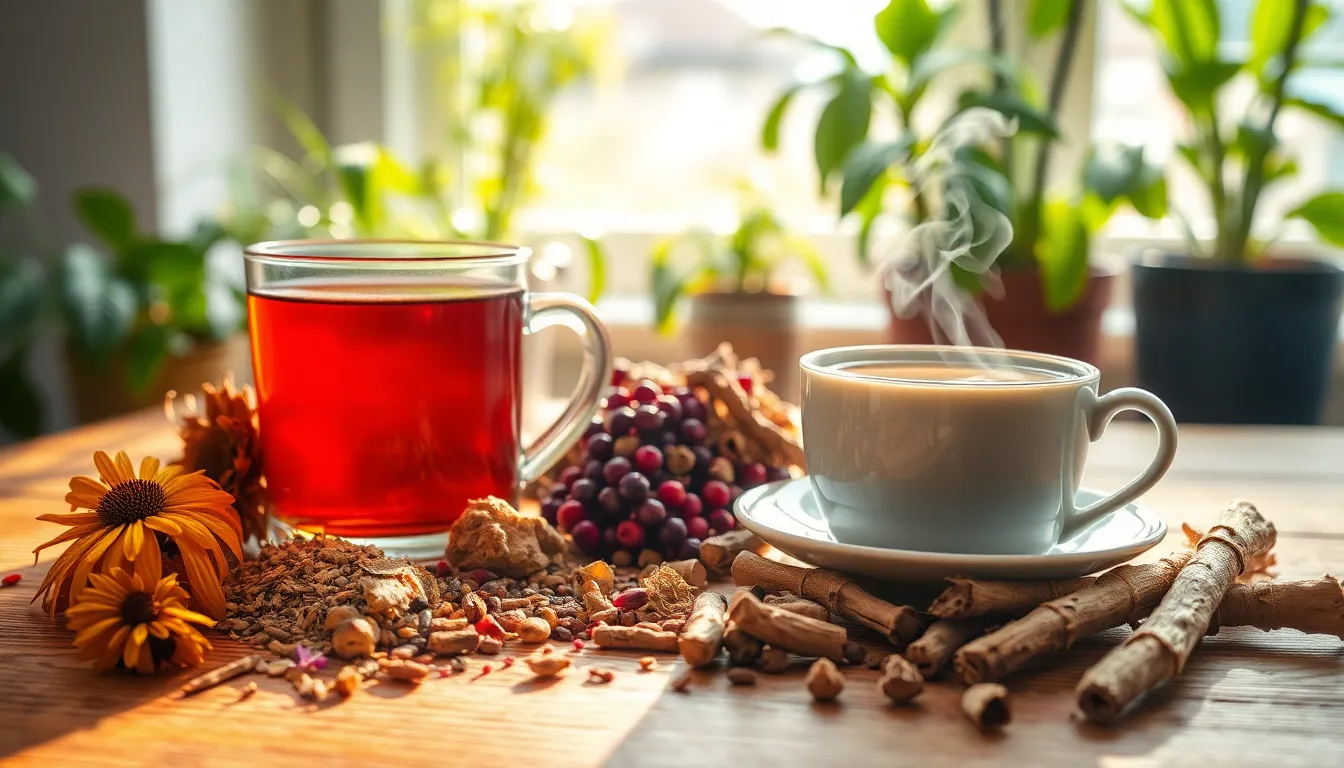In an age where health is paramount, many are turning to nature for solutions. Herbal immune support has gained traction as a potent way to enhance the body’s defenses against illness. With a rich history in traditional medicine, various herbs are believed to bolster immunity and promote overall wellness.
From ancient practices to modern wellness trends, the use of herbs like echinacea, elderberry, and astragalus has captured attention. These natural remedies offer a holistic approach, providing essential nutrients and compounds that may help the body fight off infections. As people seek alternatives to synthetic supplements, herbal options present an appealing and accessible choice for those looking to strengthen their immune systems.
Table of Contents
ToggleOverview of Herbal Immune Support
Herbal immune support refers to the use of plants and plant-derived substances aimed at enhancing the body’s immune system. This practice has deep roots in traditional medicine across various cultures. Numerous herbs are utilized for their health-promoting properties, targeting different aspects of immune function.
Key Herbs for Immune Support
- Echinacea
Echinacea is commonly used for its potential to reduce the duration and severity of colds. Research suggests that it may boost white blood cell production, thus enhancing the body’s ability to fight infections.
- Elderberry
Elderberry contains antioxidants that may help combat viruses. Clinical studies indicate that elderberry extract can shorten the duration of flu symptoms and promote overall immune response.
- Astragalus
Astragalus is known for its adaptogenic properties. It may help strengthen the immune system by increasing the production of immune cells, improving the body’s resilience against stress and illness.
Mechanisms of Action
Herbal immune support works through various mechanisms. Compounds within these herbs, such as flavonoids and polysaccharides, can stimulate cellular activity and promote a balanced immune response. Active constituents support inflammation regulation and enhance direct pathogen resistance.
Dosage and Administration
Herbal remedies can be consumed in different forms, including teas, capsules, tinctures, and extracts. It’s essential to follow dosage guidelines provided by healthcare professionals or product manufacturers to ensure effectiveness and safety.
Conclusion
Herbal immune support offers a natural approach to maintaining health. As more individuals explore these alternatives, it becomes imperative to consider the evidence supporting their efficacy and discuss any concerns with healthcare providers.
Key Herbs for Immune Boosting

Several key herbs significantly contribute to immune support, each with unique properties and benefits.
Echinacea
Echinacea, often referred to as coneflower, commonly serves as a popular herbal remedy. Research indicates that it may reduce the duration and severity of colds. Echinacea contains compounds such as polysaccharides and flavonoids, which stimulate immune response and enhance the body’s defense mechanisms. Available forms include capsules, tinctures, and teas, making it easy to incorporate into daily routines.
Elderberry
Elderberry is recognized for its antiviral properties, particularly against influenza and other respiratory viruses. Studies suggest that elderberry extract can shorten the duration of flu symptoms and improve recovery times. Rich in antioxidants, elderberries provide anthocyanins, which contribute to immune modulation. Elderberry syrup and gummies are popular forms, allowing for simple and effective consumption.
Astragalus
Astragalus, an adaptogenic herb, supports immune health by improving resilience to stress and promoting overall vitality. This herb enhances the production of white blood cells, crucial for resisting infections. Research indicates that astragalus may also reduce inflammation and enhance the effectiveness of vaccinations. Available as capsules, powders, and teas, it offers versatile options for incorporating into health regimens.
Health Benefits of Herbal Immune Support
Herbal immune support offers numerous health benefits, primarily through the bioactive compounds found in plants. These benefits include antioxidant properties and anti-inflammatory effects that contribute to overall wellness.
Antioxidant Properties
Antioxidants protect the body from oxidative stress, a major contributor to various illnesses. Herbs such as elderberry and echinacea contain high levels of flavonoids, which neutralize free radicals. Research indicates that flavonoids enhance immune function while reducing cellular damage. For instance, elderberry extract has shown potential in increasing antioxidant enzyme activity, thus supporting the body’s defense against infections. Many individuals consume these herbs in forms like capsules, teas, or syrups for optimal antioxidant benefits.
Anti-Inflammatory Effects
Anti-inflammatory compounds in herbal remedies help regulate the immune system and alleviate chronic inflammation. Echinacea contains caffeic acid and other constituents that may reduce inflammation markers in the body. Studies demonstrate that regular consumption can lead to lower levels of pro-inflammatory cytokines, which can enhance overall immune performance. Astragalus, with its adaptogenic properties, is recognized for modulating inflammation and potentially improving chronic disease outcomes. Available in various forms, these herbs are commonly integrated into daily wellness routines for their anti-inflammatory effects.
How to Incorporate Herbs into Your Routine
Incorporating herbs into daily routines enhances immune support effectively. Several methods exist to ensure consistent usage of these beneficial plants.
Teas and Infusions
Teas and infusions offer a soothing way to consume immune-boosting herbs. Herbalists often suggest brewing echinacea or elderberry as teas. To prepare, steep one to two teaspoons of dried herb in hot water for 5 to 10 minutes. Drinking these teas two to three times a day can maximize their immune-supportive properties. Additionally, herbal infusions can be combined with other ingredients, like honey or lemon, for improved flavor and added health benefits.
Supplements and Extracts
Supplements and extracts provide concentrated forms of herbs for those preferring convenience. Capsules containing echinacea, elderberry, or astragalus deliver precise dosages without preparation time. Tinctures, which are alcohol-based extracts, offer another option. They can be added to water or taken directly. When choosing supplements, selecting high-quality products from reputable manufacturers ensures reliability and safety. Adhering to recommended dosages promotes optimal results while minimizing potential side effects.
Safety and Considerations
Herbal immune support offers many benefits, but safety and efficacy should be primary concerns. Individuals must consider potential interactions with medications or existing health conditions. Consulting healthcare providers ensures that herbal remedies are appropriate for personal health circumstances.
Potential side effects exist for some herbs. Echinacea may cause allergic reactions in individuals sensitive to daisies. Elderberry, while generally safe, can lead to gastrointestinal discomfort if consumed in excessive amounts. Astragalus, in high doses, might affect blood pressure or interact with immunosuppressants.
Quality of herbal products significantly impacts safety. High-quality herbs should come from reputable sources with third-party testing for purity and potency. Checking for certifications, such as USDA organic or cGMP compliance, may help consumers select reliable products.
Dosage guidelines provide crucial information. Standard dosages vary based on the form of the herb. For instance, echinacea tea uses about 2-3 grams of dried herb per cup, taken two to three times daily. Elderberry syrups commonly contain 1-2 tablespoons, while astragalus capsules often range from 500 to 1,000 mg daily. Adhering to these guidelines maximizes benefits and minimizes risks.
Pregnant or nursing individuals, as well as those with specific medical conditions, should exercise caution. Certain herbs may not be safe during pregnancy, while others could exacerbate health issues like autoimmune disorders. Herbal support may be beneficial, yet each person’s health profile should guide decisions.
Herbal immune support offers a natural approach to enhancing health and resilience. With a rich history in traditional medicine these herbs provide a wealth of nutrients and compounds that can help the body fend off infections. By incorporating options like echinacea elderberry and astragalus into daily routines individuals can tap into their potential benefits.
It’s essential to prioritize quality and adhere to recommended dosages to ensure safety and maximize effectiveness. Consulting healthcare providers can further guide individuals in making informed choices about herbal remedies. Embracing these natural alternatives may lead to a stronger immune system and overall better health.





